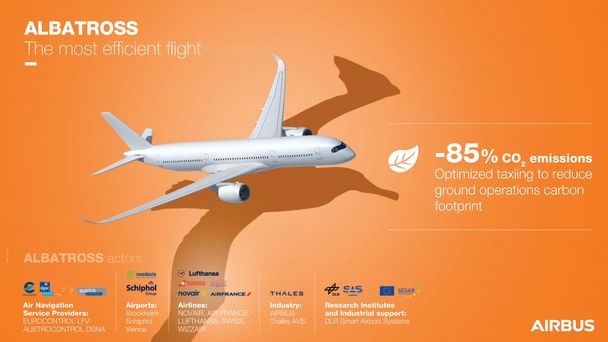Seeking the most efficient flight - Episode 4 : sustainable taxiing on ground

Did you know that sustainable taxiing vehicles can significantly reduce CO2 and noise emissions during ground operations at airports? This is the idea behind the hybrid vehicle Airbus is currently testing during its ALBATROSS missions on ground.
|
Coordinated by Airbus in the Single European Sky ATM Research program (SESAR), ALBATROSS* is an initiative of major European aviation stakeholders to demonstrate how several solutions - covering all the flight phases including operations on ground and during the flight - can be combined and used all together to further reduce the environmental footprint of aviation in the short term. Through the various operational solutions put into practice during the ALBATROSS' missions, Airbus and its partners are exploring how we could optimize aircraft “Taxi-In” and “Taxi-Out” phases without use of jet engine power thanks to a semi robotic and hybrid towing vehicle. *: Please note that ALBATROSS is a separate initiative from the Airbus “AlbatrossOne” wing project. |
Aircraft taxiing at airport with semi robotic and hybrid towing vehicle
“To move around an airport - from the terminal gate to the take-off point (Taxi-Out phase) and return it to the gate after landing (Taxi-In phase) - Aircraft mostly use their own engines, and as a consequence, consume fuels, emit CO2 and create noise at airports. And yet, that can be done differently with immediate effects on the environment” explain Nicolas Juillan, Safety & Security manager, and Nicolas Duval, Fuel Efficiency & Operations manager.
To achieve this, the Airbus Team is working on an alternative semi robotic and hybrid towing vehicle for aircraft taxiing assistance. The hybrid engine, controlled by the pilot from the cockpit using the regular pilot controls, can move an aircraft during Taxi-In and Taxi-Out operations without use of jet engines to get to and from the runway. Instead they use an alternative power source - diesel-electric - solution.
Many different partners are involved in this new taxiing approach : The handling agent is responsible for operating the vehicle before it has been attached to the aircraft and pushback, the pilot is responsible for operating the vehicle during Taxi-In & Taxi-Out phases and the airport infrastructure is responsible for the successful management of ground traffic.
By significantly reducing CO2 emissions and noise pollution while improving gates’ trafic efficiency and air quality at airports, hybrid taxiing assistance represents a major milestone in a more sustainable ground traffic management.
Towards a more sustainable ground traffic management
By enabling aircraft to turn off their engines during taxiing operations, the vehicle allows a reduction of noise emission and a reduction of fuel-burn and CO2 emissions up to 85% while improving air quality around airports as well. “For an A320 with 3 take-off per day from Paris Roissy Airport it represents 133t. of fuel and 500t. of CO2 saved per year” says Nicolas Juillan.
In addition to environnemental benefits, it makes cost savings for airlines and allows a reduction of engines Foreign Object Debris (FOD) up to 50% during Taxi-Out operations. For the airport it improves the gate efficiency through the reduction of wasted time during engine start-up at the gate area, paving the way for a more sustainable ground traffic management.
The vehicle capability is already certified on in-service Airbus aircrafts. Improvements are under development to remove current Cockpit HMI (Human Machine Interface) specificities and ease implementation for in-service aircrafts. This modification will be certified in forward linefit and retrofit. Certification is expected Q1 2022 and studies are already launched for A220.
“In the coming months we plan to perform 170 taxiing missions on A320 during the ALBATROSS demo-tour in Europe. These missions will allow us to measure their concrete benefits and demonstrate the feasibility of a sustainable ground traffic management as a standard procedure in coordination with each partner involved”, says Nicolas Juillan.